
By Alka Upadhyay
New Delhi : A less well-known event in the history of earth systems research is the not-so-successful attempt to create Biosphere 2 in the Arizona desert. The mission was to assess whether humans were capable of building and living in self-sustaining colonies in outer space. The research ended prematurely but offers this important lesson: it is nearly impossible to create a closed ecological system that can support and maintain human life — given our limited understanding of earth systems.
I am reminded of this research as I consider that for the past two decades we collectively have been using more resources from nature than the planet can renew in a year. This might not have mattered in the 18th century when the population was small and resources seemed vast. The situation is very different today as growing populations and consumption rates pose serious threats to sustainable development.
What has been the reason for this abject apathy?
In my view, the answer lies partly in the language that business understands. Traditional financial accounting rules formed 200 years ago do not account for resources and transactions for which a value cannot be reasonably assigned, such as the benefits derived from nature or ecosystems, the competence of a workforce or the goodwill of society.
The work done by Robert Kaplan and David Norton in the last century around Balanced Scorecard was an attempt to capture tangible and intangible assets of a company leading to its financial performance. However, important aspects of environment, social and human elements were not addressed by this approach. Natural and social capital accounting is an attempt to fill this void. Some pioneering work such as “Economics of Climate Change” by Lord Nicholas Stern, and The Economics of Ecosystems and Biodiversity (TEEB) initiative have contributed in mainstreaming these subjects in business decision making.
How has Tata group embraced this concept?
Tata group appreciates the inherent benefits that exist in measuring, assessing and valuing natural and social capital for managing business risks and opportunities. We recognize that if our businesses are to thrive for another couple of centuries (the Tata group will celebrate the 150th year of its existence in 2018), we must manage well the linkages between natural capital, economic activity, profit and society.
These linkages are easy to perceive if all capitals are translated into one economic metaphor by internalizing the “externalities” of today.
To reinforce this viewpoint, the group published the Tata Sustainability Policy in 2015 — setting a framework whereby Tata companies agreed to incorporate environmental, social and ethical principles into all business decision making. While the Tata group has made significant progress in the area of environment, our journey of natural capital valuation started last year when we became a member of the Natural Capital Coalition with the objective of shaping the development of a global standardized framework.
Until now, natural capital (and indeed social capital) has for the most part been excluded from decisions and, when included, has been largely inconsistent, open to interpretation or limited to moral arguments. The coalition has since published Natural Capital Protocol to identify, measure and value impacts and dependencies on natural capital.
What progress have we made?
So far, a number of Tata companies have applied the Natural Capital Protocol to assess and value the impact of natural capital on their operations. The initial outcomes associated with doing so have been encouraging:
- Tata Steel and Tata Chemicals were able to get insights to prioritize their focus related to greenhouse gas emissions management and fresh water usage.
- Tata Power applied the Natural Capital Protocol to its hydropower business to understand the total impact of a hydro plant; it plans to apply this exercise to the appraisal of future projects.
- Tata Motors assessed its main products, namely passenger and commercial cars, in order to balance its product portfolio going forward.
- Perhaps, the most exciting outcome of the exercise was from Tata Coffee, which showed a net positive environment impact courtesy of the large coffee plantation it owns. Tata Coffee is contemplating how to use this information as a point of differentiation in a crowded marketplace.
The revelations associated with this natural capital valuation aren’t all rosy. The allocation of societal impacts for environmental drivers such as land use change, solid waste and biodiversity has been difficult. What’s more, we had to resort to value transfer techniques in the absence of primary impact studies for many environmental drivers for India. We were also challenged by the lack of knowledge regarding dependencies and the interaction between finite resources and their true value.
Most of these concerns are being addressed by working with subject matter experts to develop valuation coefficients for local context, creating common understanding around environmental impact pathways, establishing valuation techniques through capacity building workshops, and resorting to sensitivity analysis wherever the precise information are unavailable. Our learning also suggests we must very thorough with our assumptions to battle any skepticism around the subject.
What’s next?
We imagine a future when all form of capitals are assessed, valued and used by business managers for decision making. It is heartening to see that regulatory bodies such as Financial Stability Board (FSB) and Securities and Exchange Board of India (SEBI) are trying to enhance the financial accounting system by encouraging companies to disclose the holistic picture of their performance. The task force established by FSB recommends that businesses disclose climate-related financial matters in their mainstream (public) financial filings. And recently, SEBI has suggested top 500 listed companies to voluntarily adopt integrated reporting.
Natural capital and social capital protocols may not be perfect, but then what is? The businesses have to experiment, apply and do scenario planning while using these protocols. As the famous French philosopher Voltaire said, “Don’t allow the perfect to be the enemy of the good.”
In other words, instead of waiting for perfect valuation tools, our recommendation will be to experiment with evolving accounting protocols.
Source: GreenBiz

Leave a Reply